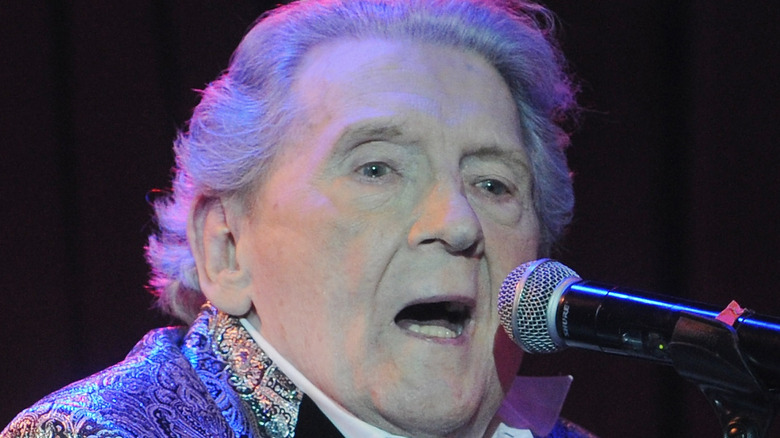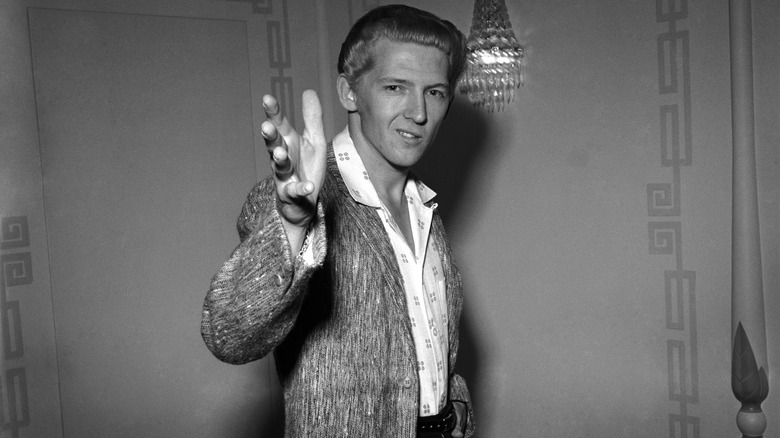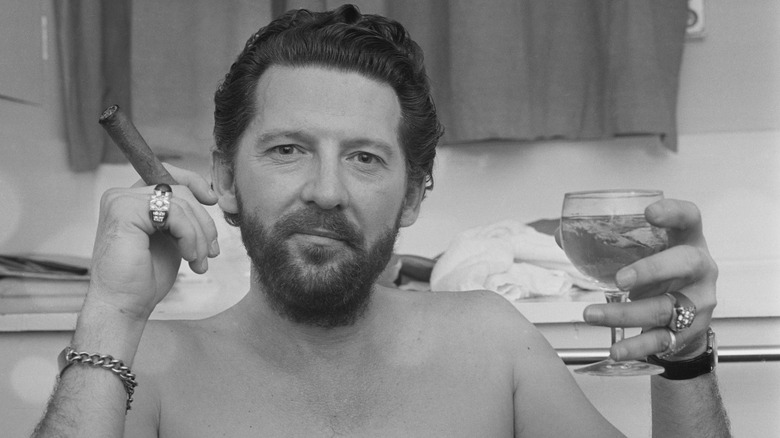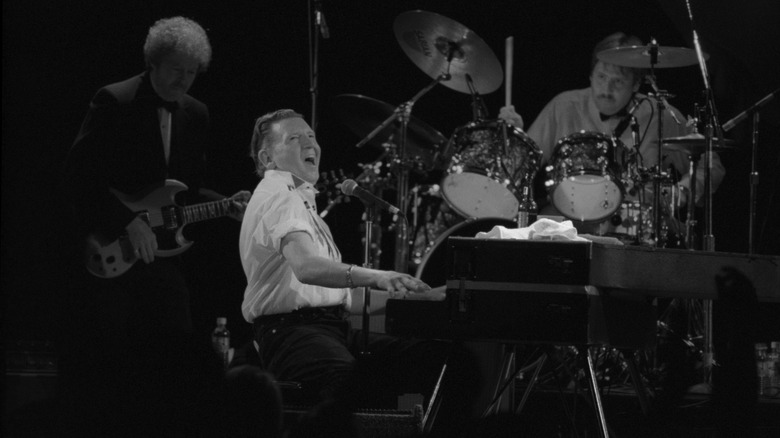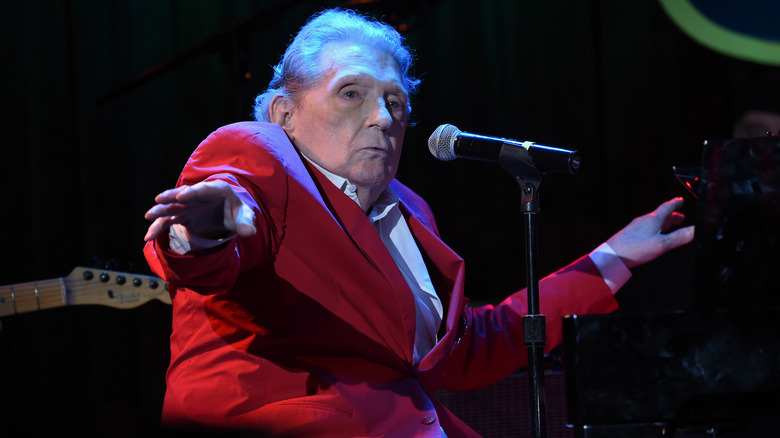The Death Of Jerry Lee Lewis Explained
The world was stunned and saddened on Friday, October 28, 2022 to hear that rock n' roll pioneer and piano-smashing legend Jerry Lee Lewis died, according to his publicist. He was 87 years old (via NBC).
Not much can be said about Jerry Lee Lewis and his place in rock n' roll history that hasn't already been said. Lewis came from the same early class of rock musicians that gave us Chuck Berry, Fats Domino, Little Richard, Carl Perkins, and Elvis Presley. While folks like Perkins and Berry rocked out on the guitar, Lewis joined Domino and Richard banging on the piano keys. His first hit single, 1957's "Whole Lotta Shakin' Goin' On," did more than help bring the baby of rhythm and blues — rock — to the masses; it charted on the country, pop, and rhythm and blues charts at the same time, as Biography cites.
Known as a hellion on-stage and off-, Lewis embodied the defiance of rock and roll from its earliest days all the way to his induction into the Rock & Roll Hall of Fame's 1986 inaugural class. He set the piano "on fire" while standing, and at one point possibly literally set a piano on fire, per Live About. He got into fights, drank too much, and had a lot of flings, as The Guardian recounts. As the Rock & Roll Hall of Fame itself says, "He is a defiant, reckless, indefatigable wild man that can rock you into oblivion."
A born showman
Jerry Lee Lewis was born in 1935 in Ferriday, Louisiana. As Biography says, he took a shine to music from an early age and started playing the piano at 9 years old. His family, who was of modest means, was so supportive of their son that they mortgaged their farm to pay for Lewis' first piano. Lewis also sang in church, enjoyed acts like Hank Williams and Al Jolson, and listened to the jukebox at Haney's Big House near his house. At the age of 14, he gave his first public performance. The venue — a car dealership — couldn't have been more perfect for a born showman, entertainer, and self-salesman. By the time Lewis attended Southwest Bible Institute in Waxahachie, Texas, his path was set — he was expelled on the spot for playing a boogie-woogie version of "My God Is Real" during church, as The Famous People says.
Lewis cut his first demo in the early 1950s with J&M Recording Studios in New Orleans, per Jukebox Playing. Recording executives weren't too impressed, advised Lewis to switch to the guitar, and Lewis promptly said no and went on his own way. A couple of years later in 1956, he got a job at Sun Studios, where he recorded a cover of Ray Price's "Crazy Arms" as well as his own original track, "End of the Road." One year later in 1957, he released his smash record, "Whole Lotta Shakin' Goin' On."
Great, self-incinerating balls of fire
Jerry Lee Lewis' second hit, "Great Balls of Fire," hit the airways the same year as his first, 1957. These two tracks in and of themselves were practically enough to cement Lewis' place in rock n' roll history, at least when combined with his off-stage hell-raising and shenanigans. Simply put, Lewis was the first to lead what we'd call a "rock star life," the kind we've seen in every out-of-control, alcohol-and-sex-fueled musician since then. Or as Lewis said of himself in The Guardian, "There was rockabilly. There was Elvis. But there was no pure rock n' roll before Jerry Lee Lewis kicked in the door." What attitude is more perfect for someone nicknamed "The Killer"?
And yet, Lewis' bravado was so intense, and his decisions so poor, that he nearly crippled his career and life just as they started taking off. In 1957, the same year as he released his initial smash hits, the 22-year-old Lewis got married for the third time. His second marriage in 1953, as All That's Interesting cites, happened 23 days before his first divorce was finalized. The third marriage, to his cousin Myra Gale Brown, would go on to last a solid 12 years. The only problem, as Biography says? Brown was 13 when they got married. Folks were in an uproar when the news broke, and Lewis' 1958 U.K. tour got canceled. No other places would book him, his music got banned, and he all but became a pariah overnight.
The return to the top
It took a long time after his marriage to his underage cousin for Lewis to return to the rock n' roll limelight. He practically vanished from society during the 1960s, as Biography says, and starting with 1968's "Another Place, Another Time" rebranded himself as a country artist. In 1972 he tried his hand at rock again, with singles like "Chantilly Lace" and "Drinkin' Wine Spo-dee-o dee." Bit by bit, Lewis earned his way back into the public's good graces. In 1986 he was inducted into the Rock & Roll Hall of Fame, and in 1989 he was awarded a star on the Hollywood Walk of Fame. That same year, his biopic "Great Balls of Fire" came out, which worked magic for his reputation.
That's not to say that Lewis' life was smooth-going by then. He got arrested for drunk driving in 1973, drove up in wild fashion to Graceland in 1976 asking for Elvis while "outta his mind ... screamin', hollerin', and cussin" (per the Official Elvis Presley Fan Club), developed a bleeding ulcer in 1981 that nearly killed him, and more. Naturally, he also got married and divorced a couple more times through the '80s. The entire time he never stopped performing. On The Guardian he said, "I was born to be on a stage. I couldn't wait to be on it. I dreamed about it. And I've been on one all my life. That's where I'm the happiest. That's where I'm almost satisfied."
A life lived to the fullest
Lewis stayed on the stage all the way to the very end of his life, even when he could no longer stand and play the piano like he used to. In the end, he garnered four Grammys over the course of his career, including a Grammy Lifetime Achievement Award, as the Grammy website says. In 2005 he received the Recording Academy's Lifetime Achievement Award and in 2007 the Rock & Roll Hall of Fame's American Music Masters Award. "I was perfect at one time," he told biographer Rick Bragg in 2014 on The Guardian, "Once, I was pretty well perfect when I hit that stage."
Such self-proclaimed perfection came at a cost, because by the time of that interview, the scars of Lewis' choices littered his life. His bedroom door was barred with steel. He kept a pistol under his pillow, an automatic on a bedside table, and more guns in his dresser drawer. One bedroom wall and an armoire were punctured by bullet holes. A bowie knife stuck out of another door. "I ain't no goody-goody," he said, "and I ain't no phoney. I never pretended to be anything, and anything I ever did, I did it wide-open as a case knife. I've lived my life to the fullest and I had a good time doin' it."
Lewis was married seven times in total, and divorced six. He is survived by his wife Judith Brown and six children.
